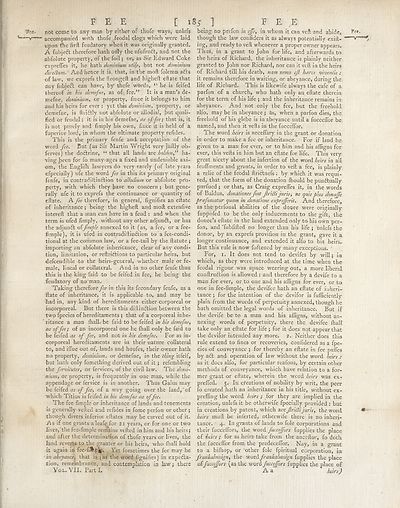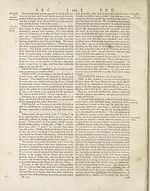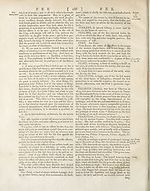Encyclopaedia Britannica > Volume 7, ETM-GOA
(203) Page 185
Download files
Complete book:
Individual page:
Thumbnail gallery: Grid view | List view

FEE [ 185 1 FEE
not come to any man by either of thofe ways, unlefs
accompanied with thofe feodal clogs which were laid
upon fhe firft feudatory when it was originally granted.
A fubjeft therefore hath only the ufufruft, and not the
abfolute property, of the foil; or, as Sir Edward Coke
expreffes it, he hath dominium utile, but not dominium
direSlum.' And hence it is, that, in the moft folemn a£ts
of law, we exprefs the (Irongeft and higheft eftate that
any fubjedl can have, by thefe words, “ he is feifed
thereof in his demefne, as of fee.” It is a man’s de-
mefne, dominium, or property, fince it belongs to him
and his heirs for ever : yet this dominium, property, or
demefne, is ftriftly not abfolute or allodial, but quali¬
fied or feodal: it is in his demefne, as of. fee; that is, it
fs not purely and Amply his own, fince it is held of a
fuperior lord, in whom the ultimate property refides.
This is the primary fenfe and acceptation of the
word fee. But (as Sir Martin Wright very juftly ob-
ferves) the doftrine, “ that all lands are holden,” ha¬
ving Jjcen for fo many ages a fixed and undeniable axi¬
om, the Englifh lawyers do very rarely (of late years
efpecially) ufe the word fee in this its primary original
fenfe, in contradiitimflion to allodium or abfolute pro¬
perty, with which they have no concern ; but gene¬
rally ufe it to exprefs the continuance or quantity of
eftate. A fee therefore, in general, fignifies an eftate
of inheritance; being the higheft and moft extenfive
intereft that a man can have in a feud : and when the
term is ufed fimply, without any other adjunft, or has
the adjunct offimple annexed to it (as, a fee, or a fee-
fimple), it is ufed in cOntradiftinftion to a fee-condi¬
tional at the common law, or a fee-tail by the ftatute ;
importing an abfolute inheritance, clear of any condi¬
tion, limitation, or reftridtions to particular heirs, but
defcendible to the heirs-general, whether male or fe¬
male, lineal or collateral. And in no other fenfe than
this is the king laid to be feifed in fee, he being the
feudatory of no'man.
Taking therefore fee in this its fecondary fenfe, as a
Hate of inheritance, it is applicable to, and may be
-had in, any kind of hereditaments either corporeal or
incorporeal. But there is this diftindtion between the
two fpecies of hereditaments ; that of a corporeal inhe-
” ritance a man {hall, be faid to be feifed in his demefne,
as of fee; of an incorporeal one he (hall only be faid to
be feifed as of fee, and not in his demefne. For as in¬
corporeal hereditaments are in their nature collateral
to, and iflue out of, lands and houfes, their owner hath
no property, dominium, or demefne, in the thing itfelf,
but hath only fomething derived out of it; refembling
the fervitutes, or fervices, of the civil law. The domi-
mum, or property, is frequently in one man, while the
appendage or fervice is in another. Thus Gaius may
be feifed as of fee, of a way going over the land,'of
which Titius is feifed in his demefne as of fee.
The fee fimple or inheritance of lands and tenements
is generally veiled and refides in fome perfon or other;
though divers inferior eftates, may be carved out of it.
As if one grants aleafe for 21 years, or for one or two
lives, the fee-fimple remains veiled in him and his heirs;
and after the determination of thofe years or lives, the
land reveres to the granter or his heirs, who flrall hold
it again in fee-fApig. . Yet fometimes the fee may be
in abeyance^ that is .(as the word fignifies) in expedla-
tion, remembrance, and contemplation in law 5 there
Vol. VII. Part I.
being no perfon in effe, in whom it can veil and abide,
though the law confiders it as always potentially exift-
ing, and ready to veil whenever a proper owner appears.
Thus, in a grant to John for life, and afterwards to
the heirs of Richard, the inheritance is plainly neither
granted to John nor Richard, nor can it veil in the heirs
of Richard till his death, nam nemo ejl hares viventis :
it remains therefore in waiting, or abeyance, during the
life of Richard. This is likewife always the cafe of a
parfon of a church, who hath only an eftate therein
for the term of his life ; and the inheritance remains in
abeyance. And not only the fee, but the freehold
alfo, may be in abeyance ; as, when a parfon dies, the
freehold of his glebe is in abeyance until a fuccefibr be
named, and then it veils in the fucceffor.
The word heirs is neceffary in the grant or donation
in order to make a fee or inheritance. For if land be
given to a man for ever, or to him and his affigns for
ever, this veils in him but an eftate for life. This very
great nicety about the infertion of the word heirs in all
feoffments and grants, in order to veil a fee, is plainly
a relic of the feodal ftrictnefs : by which it was requi¬
red, that the form of the donation fttould be pundlually
purfued; or that, as Craig expreffes it, in the words
of Baldus, donationes fint fricti juris, ne quis plus donaffe
prafumatur quam in donatione exprefferit. And therefore,
as the perfonal abilities of the donee were originally
fuppofed to be the only inducements to the gift, the
donee’s eftate in the land extended only to his own per¬
fon, and 'fubfifted no longer than his life ; unlefs the
donor, by an exprefs provifion in the grant, gave it a
longer continuance, and extended it alfo to his heirs.
But this rule is now foftened by many exceptions. ‘
For, 1. It does not tend to devifes by will; in
which, as they were introduced at the time when the
feodal rigour was apace wearing out, a more liberal
conftruftion is allowed: and therefore by a devife to a
man for ever, or to one and his affigns for ever, or to
one in fee-fimple, the devifee hath an eftate of inheri¬
tance ; for the intention of the devifor is fufficiently
plain from the words of perpetuity annexed, though he
hath omitted the legal words of inheritance. But if
the devife be to a man and his affigns, without an¬
nexing words of perpetuity, there the devifee fhall
take only an eflate for life ; for it does not appear that
the devifor intended any more. 2. Neither does this
rule extend to fines or recoveries, confidered as a fpe¬
cies of conveyance 5 for thereby an eftate in fee pafies
by aft and operation of law without the word heirs :
as it does alfo, for particular reafons, by certain other
methods of conveyance, which have relation to a for¬
mer grant or eftate, wherein the word heirs was ex-
preffed. 3. In cfeations of nobility by writ, the peer
fo created hath an inheritance in his title, without ex-
preffing the wOrd heirs ; for they are implied in the
creation, unlefs it be otherwife fpecially provided : but
in creations by patent, which are Jlricti juris, the word
heirs muft be inferted, otherwife there is no inheri¬
tance. 4. In grants of lands to foie corporations and
■their fucceffors, the word fucceffors fupplies the place
of heirs ; for as heirs take from the ancellor, fo doth
the fuccefibr from the predeceflbr. Nay, in a grant
to a bifliop, or ''other foie fpiritual corporation, in
frankalmoign, the word frankalmoign, fupplies the place
oifuccejfors (as the word fuccejfors fuppfies the place of
A a heirs)
not come to any man by either of thofe ways, unlefs
accompanied with thofe feodal clogs which were laid
upon fhe firft feudatory when it was originally granted.
A fubjeft therefore hath only the ufufruft, and not the
abfolute property, of the foil; or, as Sir Edward Coke
expreffes it, he hath dominium utile, but not dominium
direSlum.' And hence it is, that, in the moft folemn a£ts
of law, we exprefs the (Irongeft and higheft eftate that
any fubjedl can have, by thefe words, “ he is feifed
thereof in his demefne, as of fee.” It is a man’s de-
mefne, dominium, or property, fince it belongs to him
and his heirs for ever : yet this dominium, property, or
demefne, is ftriftly not abfolute or allodial, but quali¬
fied or feodal: it is in his demefne, as of. fee; that is, it
fs not purely and Amply his own, fince it is held of a
fuperior lord, in whom the ultimate property refides.
This is the primary fenfe and acceptation of the
word fee. But (as Sir Martin Wright very juftly ob-
ferves) the doftrine, “ that all lands are holden,” ha¬
ving Jjcen for fo many ages a fixed and undeniable axi¬
om, the Englifh lawyers do very rarely (of late years
efpecially) ufe the word fee in this its primary original
fenfe, in contradiitimflion to allodium or abfolute pro¬
perty, with which they have no concern ; but gene¬
rally ufe it to exprefs the continuance or quantity of
eftate. A fee therefore, in general, fignifies an eftate
of inheritance; being the higheft and moft extenfive
intereft that a man can have in a feud : and when the
term is ufed fimply, without any other adjunft, or has
the adjunct offimple annexed to it (as, a fee, or a fee-
fimple), it is ufed in cOntradiftinftion to a fee-condi¬
tional at the common law, or a fee-tail by the ftatute ;
importing an abfolute inheritance, clear of any condi¬
tion, limitation, or reftridtions to particular heirs, but
defcendible to the heirs-general, whether male or fe¬
male, lineal or collateral. And in no other fenfe than
this is the king laid to be feifed in fee, he being the
feudatory of no'man.
Taking therefore fee in this its fecondary fenfe, as a
Hate of inheritance, it is applicable to, and may be
-had in, any kind of hereditaments either corporeal or
incorporeal. But there is this diftindtion between the
two fpecies of hereditaments ; that of a corporeal inhe-
” ritance a man {hall, be faid to be feifed in his demefne,
as of fee; of an incorporeal one he (hall only be faid to
be feifed as of fee, and not in his demefne. For as in¬
corporeal hereditaments are in their nature collateral
to, and iflue out of, lands and houfes, their owner hath
no property, dominium, or demefne, in the thing itfelf,
but hath only fomething derived out of it; refembling
the fervitutes, or fervices, of the civil law. The domi-
mum, or property, is frequently in one man, while the
appendage or fervice is in another. Thus Gaius may
be feifed as of fee, of a way going over the land,'of
which Titius is feifed in his demefne as of fee.
The fee fimple or inheritance of lands and tenements
is generally veiled and refides in fome perfon or other;
though divers inferior eftates, may be carved out of it.
As if one grants aleafe for 21 years, or for one or two
lives, the fee-fimple remains veiled in him and his heirs;
and after the determination of thofe years or lives, the
land reveres to the granter or his heirs, who flrall hold
it again in fee-fApig. . Yet fometimes the fee may be
in abeyance^ that is .(as the word fignifies) in expedla-
tion, remembrance, and contemplation in law 5 there
Vol. VII. Part I.
being no perfon in effe, in whom it can veil and abide,
though the law confiders it as always potentially exift-
ing, and ready to veil whenever a proper owner appears.
Thus, in a grant to John for life, and afterwards to
the heirs of Richard, the inheritance is plainly neither
granted to John nor Richard, nor can it veil in the heirs
of Richard till his death, nam nemo ejl hares viventis :
it remains therefore in waiting, or abeyance, during the
life of Richard. This is likewife always the cafe of a
parfon of a church, who hath only an eftate therein
for the term of his life ; and the inheritance remains in
abeyance. And not only the fee, but the freehold
alfo, may be in abeyance ; as, when a parfon dies, the
freehold of his glebe is in abeyance until a fuccefibr be
named, and then it veils in the fucceffor.
The word heirs is neceffary in the grant or donation
in order to make a fee or inheritance. For if land be
given to a man for ever, or to him and his affigns for
ever, this veils in him but an eftate for life. This very
great nicety about the infertion of the word heirs in all
feoffments and grants, in order to veil a fee, is plainly
a relic of the feodal ftrictnefs : by which it was requi¬
red, that the form of the donation fttould be pundlually
purfued; or that, as Craig expreffes it, in the words
of Baldus, donationes fint fricti juris, ne quis plus donaffe
prafumatur quam in donatione exprefferit. And therefore,
as the perfonal abilities of the donee were originally
fuppofed to be the only inducements to the gift, the
donee’s eftate in the land extended only to his own per¬
fon, and 'fubfifted no longer than his life ; unlefs the
donor, by an exprefs provifion in the grant, gave it a
longer continuance, and extended it alfo to his heirs.
But this rule is now foftened by many exceptions. ‘
For, 1. It does not tend to devifes by will; in
which, as they were introduced at the time when the
feodal rigour was apace wearing out, a more liberal
conftruftion is allowed: and therefore by a devife to a
man for ever, or to one and his affigns for ever, or to
one in fee-fimple, the devifee hath an eftate of inheri¬
tance ; for the intention of the devifor is fufficiently
plain from the words of perpetuity annexed, though he
hath omitted the legal words of inheritance. But if
the devife be to a man and his affigns, without an¬
nexing words of perpetuity, there the devifee fhall
take only an eflate for life ; for it does not appear that
the devifor intended any more. 2. Neither does this
rule extend to fines or recoveries, confidered as a fpe¬
cies of conveyance 5 for thereby an eftate in fee pafies
by aft and operation of law without the word heirs :
as it does alfo, for particular reafons, by certain other
methods of conveyance, which have relation to a for¬
mer grant or eftate, wherein the word heirs was ex-
preffed. 3. In cfeations of nobility by writ, the peer
fo created hath an inheritance in his title, without ex-
preffing the wOrd heirs ; for they are implied in the
creation, unlefs it be otherwife fpecially provided : but
in creations by patent, which are Jlricti juris, the word
heirs muft be inferted, otherwife there is no inheri¬
tance. 4. In grants of lands to foie corporations and
■their fucceffors, the word fucceffors fupplies the place
of heirs ; for as heirs take from the ancellor, fo doth
the fuccefibr from the predeceflbr. Nay, in a grant
to a bifliop, or ''other foie fpiritual corporation, in
frankalmoign, the word frankalmoign, fupplies the place
oifuccejfors (as the word fuccejfors fuppfies the place of
A a heirs)
Set display mode to:
![]() Universal Viewer |
Universal Viewer | ![]() Mirador |
Large image | Transcription
Mirador |
Large image | Transcription
Images and transcriptions on this page, including medium image downloads, may be used under the Creative Commons Attribution 4.0 International Licence unless otherwise stated. ![]()
| Encyclopaedia Britannica > Encyclopaedia Britannica > Volume 7, ETM-GOA > (203) Page 185 |
|---|
| Permanent URL | https://digital.nls.uk/189123868 |
|---|
| Attribution and copyright: |
|
|---|
| Description | Ten editions of 'Encyclopaedia Britannica', issued from 1768-1903, in 231 volumes. Originally issued in 100 weekly parts (3 volumes) between 1768 and 1771 by publishers: Colin Macfarquhar and Andrew Bell (Edinburgh); editor: William Smellie: engraver: Andrew Bell. Expanded editions in the 19th century featured more volumes and contributions from leading experts in their fields. Managed and published in Edinburgh up to the 9th edition (25 volumes, from 1875-1889); the 10th edition (1902-1903) re-issued the 9th edition, with 11 supplementary volumes. |
|---|---|
| Additional NLS resources: |
|

